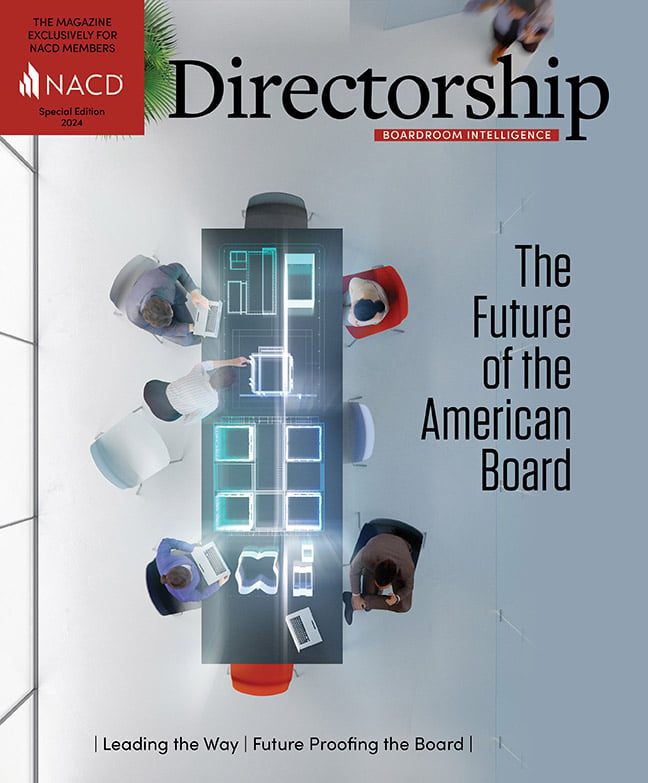Boards of directors need to be future-ready. Incorporating principles of effective corporate governance can help prepare boards to tackle challenges facing corporations and boardrooms today—and tomorrow.
The Greek philosopher Heraclitus is credited with the adage that the only constant is change, or “one cannot step in the same river twice.” Boards have long navigated change, whether from technological innovation, business model disruption, shareholder activism, or new regulation, and more recently from the global pandemic. In the current environment a particularly unique set of headwinds is challenging board capacity and ultimately corporate resiliency: inflation and higher interest rates (and a potential recession); expanding geopolitical tensions and a related global rise in national protectionism; resource scarcity, whether from supply chain bottlenecks or commodity shortages; an increase in severe weather events (drought, heatwaves, floods); and a highly competitive market for talent amid demographic change. Add to these two forces in direct tension: On the one hand, investors, customers, and employees are increasingly assessing corporations not only on financial performance, product and service quality, and employee satisfaction, but also on broader societal and environmental impact. They are demanding greater corporate transparency and accountability on issues such as climate change and diversity, equity, and inclusion. On the other hand, in the current polarized political sphere, investor and corporate attention to environmental, social, and governance (ESG) issues is criticized by those who view ESG as furthering an unduly progressive agenda. The challenges presented for boards are considerable.
As the Future of the American Board Report: A Framework for Governing into the Future, published by NACD, recognizes, governing a company to succeed in this fast-moving, highly complex, and disruptive world of competing demands requires that the board be focused, agile, and highly attuned to the environment in which the company operates, the risks to which it is exposed, the varied and often competing expectations of key stakeholders, and the likely impact of corporate actions. It requires looking beyond narrow, near-term financial measures to the company’s broader purpose, and considering how to fulfill that purpose based on an understanding of the codependent relationship between long-term success and the fair interests and expectations of customers, employees, suppliers, regulators, the communities in which the company operates, and other key stakeholders.
The next level of governance improvement is not amenable to checklists. It requires fine-tuning in a nuanced and context-dependent manner, and it depends to a large degree on the collective behaviors of individual directors. The Future of the American Board Report sets out principles intended to help boards tailor their governance for rapidly changing and challenging circumstances. For boards to set themselves up for future success, they must tailor their practices and behaviors based on an understanding of emerging norms of effective governance.
While the environment in which boards govern continues to grow in complexity—and as expectations of shareholders and other constituents broaden—the responsibility of the board and the legal duties of directors remain durable: the board must manage and direct the affairs of the business, and directors must apply prudence and diligence in the best interests of the corporation and the shareholding body. This requires active oversight of those to whom the board has delegated management authority, and the exercise of business judgment in considering strategic opportunities and risks. These obligations are durable, but they are also very context-dependent, and the context is complex and ever changing. Every board must use its own judgment as it navigates the dynamic business environment in light of intense scrutiny from institutional shareholders, hedge fund activists, key constituents and interest groups, regulators, and the media.
Corporations do more than provide economic benefits. They provide goods and services that benefit society—and doing so is key to the license to do business. As Novartis CEO Vasant “Vas” Narasimhan said at the World Economic Forum in late 2022, “The reasons corporations exist at all is because we believe the profit motive enables us to advance society and solve problems. In the end, for all of us, we have to be super clear on the purpose and mission of our individual enterprises, be super clear that when we deliver on our mission in a sustainable way.... That’s why our corporations exist.” Now and in the future, corporations will be looked to for solutions to help build a better world, with success viewed through a longer and broader lens in which avoidance of undue risk and mitigation of negative impact will be critical. To quote BlackRock CEO Laurence D. Fink, “This is not about politics. It is not a social or ideological agenda. It is not ‘woke.’ It is capitalism, driven by mutually beneficial relationships between you and the employees, customers, suppliers, and communities your company relies on to prosper.”
As The Future of the American Board Report conveys, the long-term success of a corporation depends on a clear sense of purpose and delivering value that satisfies the fair interests of a range of key stakeholders. Boards play a distinct and critical role in this endeavor. This report can help directors lead the way for a better future for the corporations they serve, which in turn, can yield positive benefits for society today and for years to come.
Summary of Principles
The Future of the American Board Report: A Framework for Governing into the Future lays out 10 principles for boards to consider as they tailor their governance for changing circumstances. Each principle is supported by key implications, relevant context, and key questions.
Corporate Purpose: The first principle emphasizes that the purpose of a corporation is defined by the problem or need that is met by the goods and services the corporation provides. When purpose in this respect is well articulated, it becomes a powerful force to motivate and unify corporate activity and to set priorities. It is by carrying out the corporation’s purpose—by creating goods and services that customers need or want—that profit is achieved. Achieving profit requires not only satisfying customers, but also maintaining beneficial relationships with employees, suppliers, regulators, and the communities in which the company operates.
Responsibility & Accountability: The second principle has two important aspects: First, it draws on the board’s legal mandate to manage and direct the affairs of the corporation by emphasizing that how the board governs and sets priorities is a matter of self-determination. Boards cannot be passive or rely wholly on others’ notions of effective governance—they must work it out for themselves. Second, it recognizes that consideration of employee, customer, and other stakeholder interests is key to acting in the corporation’s best interests and delivering value over the long term to shareholders.
Objectivity & Oversight: The third principle draws heavily from recent case law about what is expected of boards with respect to their oversight of mission-critical risk. It reminds the board that it needs to be distinct from management in leadership, composition, and mindset so that it brings objectivity to its decisions and oversight function. It also suggests that oversight is a continuing inquiry into whether the board’s delegation of authority to management is reasonable.
Agenda & Information: The fourth principle builds on the earlier point made about governance self-determination. It emphasizes that the board itself is responsible for ensuring it is positioned for informed, deliberative, and agile decision-making. This requires board determination of priorities and information needs and board oversight of information and reporting systems. The report also emphasizes that in this complex and fast-changing world, the board must be more agile—it must have the capacity to address critical issues as they arise in a decisive and efficient yet well-informed manner. And it must be able to exercise humility and pivot when change is necessary. This requires continual learning to understand changes in the environment that may affect corporate strategy and risk. Indeed, a key theme throughout the report relates to board agility and director commitment. Simply put, much more is required of directors to stay well informed and to be available on a far more frequent and flexible basis.
Board-Management Relations: The fifth principle focuses on the importance of a clear understanding of and respect for the distinct roles of management and the board and the development of a candid, constructive relationship in which the board both supports and challenges management. Of course, the line between managing and directing may change according to the circumstances. But if directors overstep, management becomes less responsible for performance and the oversight mechanism is degraded. Overstepping can also undermine both CEO confidence and the trust with the board that is so important—and a lack of trust can result in less candor.
Strategy & Risk: The sixth principle emphasizes that strategy and risk must be a priority. It emphasizes again the importance of agility to the board’s ability to help the company adapt to change and recognizes that given the pace and scope of change, more time is required of directors to monitor strategic milestones and stay up to date about risks, trends, developments, competition, and the environment in which the company operates. This includes understanding how environmental and social issues relate to the company’s strategy, operations, risk profile, and relationships with key stakeholders.
Talent & Compensation: The seventh principle acknowledges that increasingly employees are attracted to corporations that express values and purpose they find meaningful and show respect for their contributions to the team. It calls on the board to attend to issues affecting the workforce and to understand the link between strategic imperatives and officer and employee capabilities and constraints.
Corporate & Board Culture: The eighth principle highlights the importance of both board and corporate culture to success. It calls on the board to define and monitor the parameters of the desired culture. It also recognizes that establishing a strong board culture depends on agreed-upon norms of behavior and that having such norms can be helpful in both preventing and addressing misbehavior by a director.
Composition, Refreshment & Diversity: The ninth principle reminds the board to avoid defaulting to renomination rather than undertaking tough decisions.
Transparency, Communications & Engagement: The tenth principle suggests that the board value and recognize interactions with employees and other key stakeholders as opportunities to learn about their interests and concerns, and to build trust. ■
This article is from the Directorship Special Issue 2024: The Future of the American Board.
Photo Credit: stock.adobe.com/surachetkhamsuk





